FOCUS
ON RUST - FROM CORROSION TO BEAUTY
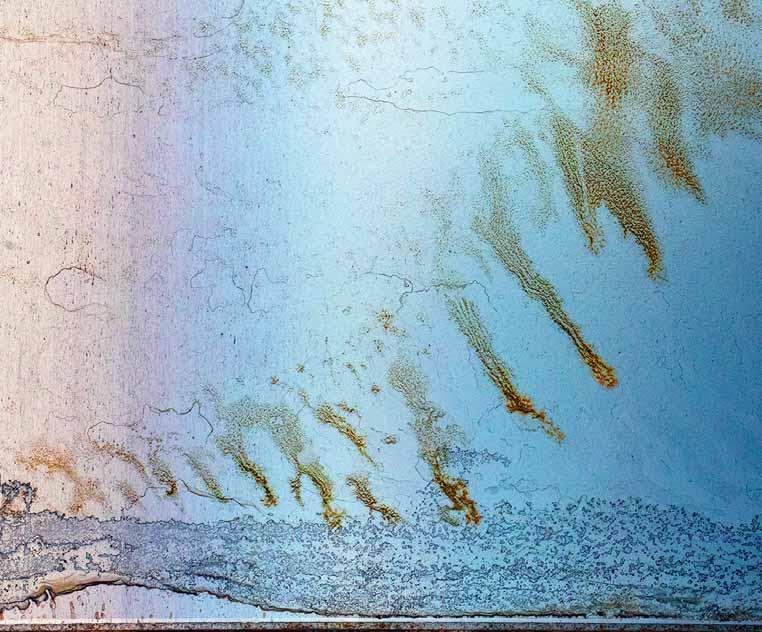
Tony Hanmer's new rustinspired group exhibition opens September 30 at The Exchange, featuring 16 of his most unique photographs PAGE 10
Lessons from a Mercenary - Sam Patten, Former Advisor to the UNM and GD, on the Benefits of Switching Sides
BLOG BY SAM PATTEN*
Stop taking notes, - my boss told me. She could tell her guest was scared, because, even here, on the seventh floor of America’s State Department, she had reason to fear that – through me – Misha was still listening.
Just before I was appointed to help turn out the lights at State during the end of the second term of the George W. Bush administration, I had been an advisor to Georgia’s United National Movement, led by then-president Mikheil “Misha” Saakashavili. When Russia invaded in August 2008, the most I could do from Washington DC was volunteer for overnights at State’s op center and pray that Russian tanks would not reach Tbilisi.
Now, so much has changed: my boss’ guest from 2008, Salome Zurabashvili, is now Georgia’s president – even if she is about to be impeached for visiting Europe. Misha sits in prison in Georgia, in what appears to be a lifethreatening state of ill-health. And I am a convict in America, having pled guilty to failing to register as a foreign agent for a Ukrainian politician in 2018. So the worm turns.
In this week’s issue...
Georgian President Meets with Presidents of Estonia, Latvia and Lithuania
NEWS PAGE 2
Escalating Tensions in Nagorno-Karabakh: A Week of Unrest and Uncertainty as Thousands Flee the Area
NEWS PAGE 3
“Russia Can’t Survive in its Current Form” – Interview with Sergei Medvedev on Karabakh and Russia
POLITICS PAGE 4
GT Sponsors Georgia & Armenia Tech/AI Hub Summit 2023 in Georgia
BUSINESS PAGE 6
Digital Construction Forum 2023
Georgia is the first country where I “switched sides” and, in effect, became a political mercenary. The idea first struck me when I was seated across the table from another Georgian politician during my stint at Freedom House – the democracy and human rights watchdog – when something he said made me bring up the story of Giorgi Saakadze who, as every Georgian knows, paid a terrible cost for switching sides, even if it was to his homeland’s benefit.
As I relate in my action memoir Dangerous Company: The Misadventures of a “Foreign Agent,” I accepted a job offer a couple years after the war from Irakli Alasania and his Free Democrats party to help them prepare for the 2012 election. After several months, billionaire Bidzina Ivanishvili folded the Free Democrats into his Georgian Dream coalition. For better or for worse, I was present at its creation. Possessing insights, and friends, on both sides of what was then Georgia’s political divide was not easy for me. In fact, it was quite searing. Had I betrayed Misha-world? Yes, but with reason. Opposition politicians had come to fear the Saakashvili government that the West so adored, and the genesis of the war lay in part with Misha’s temperament.
BUSINESS PAGE 7
CENN – The Legacy Will Go On, Says New CEO
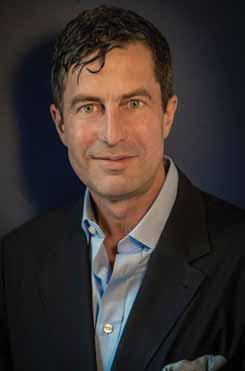
Laurent G. Nicole
BUSINESS PAGE 8
Georgian Wrestling on Its Way to the Olympic Family
SPORTS PAGE 9
Tbilisi Hosted the Final Concert of Night Serenades 2023
CULTURE PAGE 11
Issue no: 1418 • • SEPTEMBER 29 - OCTOBER 5, 2023 • • PUBLISHED WEEKLY
PRICE: GEL 2.50
Continued on page
4
Sam Patten, former advisor to the UNM and GD
Ukraine Latest: Russia Raises Conscription Age Limit, Zelensky Gives Fresh Corruption Warning
Vladimir Putin to “silence your guns, withdraw your troops and end your brutal aggression.”
EU EXPANDS SANCTIONS ON BELARUS FOR INVOLVEMENT IN RUSSIA’S WAR IN UKRAINE
The European Union wrote on the social media platform X, formerly known as Twitter, that it was imposing additional sanctions on Belarus for the country’s involvement in Russia’s war in Ukraine.
The European Union has agreed on a draft resolution to ban exports of aviation equipment to Belarus, Russia’s closest ally.
NORTH KOREA AND RUSSIA TO STRENGTHEN COOPERATION, DEFENSE MINISTER SHOIGU SAYS
Russia and North Korea on Wednesday announced plans to strengthen their defense cooperation, Reuters reported Defense Minister Sergei Shoigu as saying.
COMPILED
BY ANA
DUMBADZE
Russia on Tuesday expanded its military conscription base after a vote to raise the upper age limit from 27 to 30 passed in the lower house.

The bill, once signed into law by President Vladimir Putin, is expected to add 2.4 million men to Russia’s forces and will prohibit conscripts from leaving the country once they are called up for duty.
The same day, Ukrainian President Volodymyr Zelensky said that he would not tolerate corruption or treachery in affairs of state as the country continues to wage its war against Russia.
Zelensky’s appeal, shared in his nightly address, came after the arrests of a military recruitment official accused of mass embezzlement and of a parliamentarian suspected of collaborating with Russia.
On the front lines, Kyiv said Tuesday that its military had made small advances against Russian forces in parts of southern Ukraine, moving forward toward the southeastern village of Staromayorske in the Donetsk region.
Meantime, Russia’s Ministry of Defense said it had destroyed two unmanned Ukrainian boats engaged in an attack on one of its Black Sea fleet patrol ships.
UKRAINE-NATO COUNCIL HOLDS URGENT MEETING TO DISCUSS BLACK SEA SECURITY
Ukrainian President Volodymyr Zelensky said the NATO-Ukraine Council met to discuss the security of the Black Sea following Russia’s withdrawal from the Black Sea Grain Initiative.
“At the level of the alliance, the Russian attacks against our country and our ports have been clearly condemned,” Zelensky said during a nightly address.
“We discussed what specific actions
Tbilisi Opens 400 Bus Driver Positions, Mayor Announces Fleet Expansion

can bring calm and predictability to the Black Sea region. Thank you all for the substantive work of today’s NATOUkraine Council,” Zelensky added.
‘STAGGERING’ AND ‘TRULY SHAMEFUL’ - US SLAMS RUSSIA FOR ATTACKS ON UKRAINIAN HERITAGE SITES
US Ambassador to the United Nations Linda Thomas-Greenfield called the Russian attacks on Ukrainian cultural heritage sites “staggering” and “truly shameful.”
Earlier in the week, Odessa’s historic Transfiguration Cathedral was destroyed in a Russian missile strike.
Thomas-Greenfield said that according to the latest figures collected by UNESCO, about 270 cultural sites have been damaged since the start of the war last year.
“The loss of Ukrainian cultural heritage is staggering, and it is truly shameful,” she said, calling on Russian President
“I am convinced that today’s talks will contribute to strengthening cooperation between our defense departments,” Shoigu said after a meeting in Pyongyang with his North Korean counterpart.
MOLDOVA TO CUT NUMBER OF RUSSIAN EMBASSY STAFF, TASS REPORTS
Moldova’s foreign minister said Wednesday that it had cut the number of staff at its Russian embassy.
“The decision follows numerous unfriendly actions towards the Republic of Moldova, which are unrelated to the diplomatic mandate, as well as attempts to destabilize the internal situation of our country,” the ministry said.
In line with principles of equal diplomatic representation, this will reduce Russia and Moldova’s foreign mission in each other’s countries to 10 diplomatic posts and 15 administrative and technical positions each.
Russian Ambassador to Moldova Oleg
Vasnetsov said that Chisinau’s move “undermines the opportunity for dialogue between the two countries.”
“All this so-called spying scandal is a pretext for the decision made ages ago to reduce the number of diplomatic staff,” Vasnetsov told a press briefing.
US APPROVES SECURITY PACKAGE WORTH $400 MILLION FOR UKRAINE
The Biden administration approved a new security assistance package for Ukraine worth $400 million.
“The people of Ukraine continue to bravely defend their country against Russia’s aggression, while Russia continues its relentless and vicious attacks that are killing Ukrainian civilians and destroying civil infrastructure,” Secretary of State Antony Blinken wrote in a release announcing the arms package.
The weapons included in the latest package include: Additional munitions for Patriot air defense systems and National Advanced Surface-to-Air Missile Systems, or NASAMS; Stinger antiaircraft systems; Additional ammunition for High Mobility Artillery Rocket Systems, or HIMARS; 155mm and 105mm artillery rounds; 120mm and 60mm mortar rounds; 32 Stryker armored personnel carriers; Tube-Launched, OpticallyTracked, Wire-Guided or TOW missiles; Javelin and other anti-armor systems and rockets; Hornet unmanned aerial systems; Hydra-70 aircraft rockets; and tactical air navigation systems.
PUTIN EXPECTED TO VISIT CHINA IN OCTOBER, KREMLIN SAYS
The Kremlin said Russian President Vladimir Putin was invited and plans to attend the Belt and Road forum in China in October, Reuters reports.
The Biden administration has reiterated that Beijing should not assist Moscow as Washington and its Western allies coordinate rounds of sanctions for the Kremlin’s ongoing war in Ukraine.
Georgian President Meets with Presidents of Estonia, Latvia and Lithuania
BY TEAM GT
Image source: Visual China Group | Getty Images
BY MARIAM GORKHELAHVILI
Tbilisi’s Mayor, Kakha Kaladze, has announced that the Tbilisi Transport Company is opening up 400 job vacancies for bus drivers. During a municipality government meeting, Mayor Kaladze revealed that these vacancies are for drivers of 8, 10, and 12-meter buses, while the current drivers will be transitioned to operating 18-meter buses.
Mayor Kaladze further explained that the city has already acquired 160 units of 18-meter buses, currently in production, which are set to be introduced on
various routes in 2024. In anticipation of this, the Tbilisi Transport Company has initiated a program to retrain existing drivers to obtain the E category license required for operating these larger buses. Consequently, there is a need to fill the vacancies for drivers of smaller buses (8, 10, and 12 meters).
The Mayor said that the official salary for these bus driver positions ranges from 2,500 to 3,000 GEL. Those interested in securing employment should apply to the Tbilisi Transport Company. After completing the requisite interviews and internships, candidates, regardless of gender, will have the opportunity to become an M3 category bus driver. These 400 vacancies present a promising employment opportunity for individuals in Tbilisi.
Continuing to, as the ruling party Georgian Dream (GD) claims, “defy the Georgian Constitution,” Georgian President Salome Zurabishvili went on with her mission to heal the wounds caused by GD’s recent rhetoric on this, the “pivotal moment of Georgia’s European path,” and to encourage Europe’s leaders to side with the more than 80% of Georgians seeking European candidacy status.
On Tuesday, she met with Estonian President Alar Karis, in Tallinn.
“Had a great meeting with President of Georgia Salome Zurabishvili. Estonia is firmly committed to supporting Georgia’s territorial integrity and EuroAtlantic integration. We’re rooting for Georgia’s success on its EU path!” Karis reported after the meeting.
On September 26, Zurabishvili met with the President of the Republic of Latvia, Edgars Rinkevics, in Riga, who noted that, “especially because of the expectations of the Georgian society
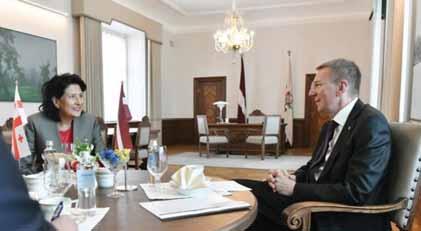
and significant support for European integration, the Georgian political forces must do everything possible to use this historic opportunity. Follow the EU recommendations and get the status.
Georgia must join the EU's common foreign and security policy, including sanctions against Russia,” he said.
President Zurabishvili answered him with the following message: “Thank you for standing with Georgia over the years. Your steadfast backing is critical for
Georgia's path to European integration.”
On September 27, the President of Georgiaspoke with President of the Republic of Lithuania, Gitanas Nauseda, in Vilnius.
“Welcomed the President of Georgia, Salome Zurabishvili, in Vilnius. Lithuania remains a supporter of Georgia’s EU and Euro-Atlantic integration,” was the reaction. “Georgia‘s future depends on its ability to focus on reforms and foster European values,” Nauseda noted.
GEORGIA TODAY SEPTEMBER 29 - OCTOBER 5, 2023 2 NEWS
President Zurabishvili met with the President of the Republic of Latvia, Edgars Rinkevics, in Riga
Image source Visual China Group | Getty Images
Escalating Tensions in Nagorno-Karabakh: A Week of Unrest and Uncertainty as Thousands Flee the Area
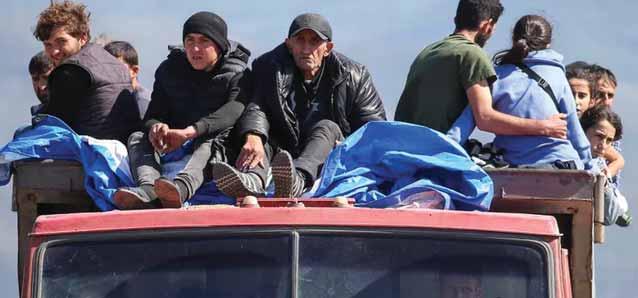 BY MARIAM GORKHELASHVILI
BY MARIAM GORKHELASHVILI
In a week marked by rising tensions, Nagorno-Karabakh once again finds itself at the center of a conflict that threatens regional stability. Armenian Prime Minister Nikol Pashinyan sounded alarm bells, stating that Azerbaijan had been amassing troops near Nagorno-Karabakh and along the Armenian-Azerbaijani border in the past few days. According to him, the military-political situation in the region had deteriorated, and a recent confrontation near the border resulted in the tragic loss of three Armenian soldiers.
Pashinyan called upon the international community to respond swiftly, fearing that Azerbaijan was preparing for armed provocation. He emphasized Armenia's commitment to implementing the ceasefire agreements reached during meetings in Brussels and Prara in 2021-2023. The recent developments follow a history of conflict in the region. NagornoKarabakh, an ethnically Armenian enclave, declared itself independent in 1991, sparking a long-standing military conflict between Armenia and Azerbaijan. Despite multiple ceasefire agreements, including those mediated by Russia and the United States, the conflict persisted, resulting in thousands of casualties over the past two years.
Azerbaijan's Ministry of Defense issued a statement, justifying its actions in Nagorno-Karabakh as anti-terrorist measures aimed at restoring the constitutional structure. They claimed that Armenian Armed Forces had initiated artillery fire, prompting a response.
Armenian Prime Minister Pashinyan vehemently denied having Armenian forces stationed in Nagorno-Karabakh, accusing unspecified external and internal forces of trying to drag Armenia into war. He asserted, "The armed forces of Armenia are not in Nagorno-Karabakh."
The situation on the ground worsened, with reports of civilian casualties and injuries. The Ombudsman of the unrecognized Nagorno-Karabakh Republic, Gagam Stepaniani, reported civilian casualties, including a child, and injuries, while Azerbaijan alleged that Armenian intelligence and sabotage groups were responsible for a mine explosion that killed six of its Ministry of Internal Affairs employees.
In response to the escalating tensions, protests erupted in Yerevan, the capital of Armenia, with demonstrators demanding the resignation of Prime Minister Pashinyan, blaming his policies for the situation in Nagorno-Karabakh.
As the situation continued to deteriorate, ethnic Armenians in NagornoKarabakh agreed to a ceasefire proposal. This decision came after Azerbaijani forces reportedly captured several strategic locations and heights, leading to Russia's proposal for a ceasefire. The self-proclaimed Republic of Artsakh released a statement accepting the ceasefire proposal offered by the command of the Russian peacekeeping contingent.
The ceasefire marked a turning point as Nagorno-Karabakh was set to return to Azerbaijani control. The truce went into effect on September 20, ending a two-day conflict that had seen significant military gains by Azerbaijan. Protests in Yerevan continued unabated, with demonstrators calling for Pashinyan's resig-
nation and a nationwide strike announced by opposition representatives.
Despite the ceasefire, the humanitarian situation in the region remained dire. Thousands of ethnic Armenians fled Nagorno-Karabakh, and Azerbaijani flags were raised in several settlements, indicating the shifting dynamics on the ground.
In response to the crisis, international efforts to provide humanitarian aid were initiated. The United States pledged $11.5 million for Karabakh Armenians' humanitarian needs, while the European Union promised 5 million euros. Despite the challenges, the evacuation process from Nagorno-Karabakh to Armenia is ongoing, with thousands of people seeking safety.
In a bid to find a diplomatic resolution, Prime Minister Pashinyan and President
Aliyev of Azerbaijan were set to meet in Granada, with the involvement of international leaders such as French President Emmanuel Macron and German Chancellor Olaf Scholz. While a peace agreement remains elusive, hopes for a peaceful resolution by the end of the year persist.
As of September 28, 53,629 people and 10,985 vehicles had left Nagorno-Karabakh. As the press secretary of the Prime Minister noted, 35,491 of the evacuated people are officially registered.
"As of 7am, 38 medical patients have been transported by air - in total, 349 patients have been transported to Armenia, both by air and by land," said the spokesperson of the Prime Minister of Armenia, adding that the evacuation process in Armenia is going smoothly, although it should be noted that due to
the large flow of people, there are queues. Today, Azerbaijan arrested the former de facto leader of Nagorno-Karabakh, Ruben Vardanian, as he attempted to cross into Armenia proper. Ruben Vardanian became the head of the de facto government of the unrecognized Nagorno-Karabakh in 2022, and left this position in 2023. Vardanian lived in Russia for years, and in 2022 gave up his Russian citizenship and moved to Nagorno-Karabakh.
As more than 65,000 have fled NagornoKarabakh, the separatist republic will ‘cease to exist.’ The separatist government of Nagorno-Karabakh on Thursday announced that it will dissolve, and the unrecognized republic will thus cease to exist by the end of the year. Armenian officials said that already more than half of the population has already left.
A Week of War Commemoration – Sokhumi and the EUMM’s 15-Year Ongoing Mission
BY TEAM GT
Georgian officials, opposition leaders, and ordinary citizens commemorated the 30th anniversary of the Fall of Sokhumi on September 27, which marked the end of armed conflict in Abkhazia in 1993.
“I believe that the future belongs to the unity, peace and prosperity of Abkhazians and Georgians,” said Prime Minister Garibashvili.
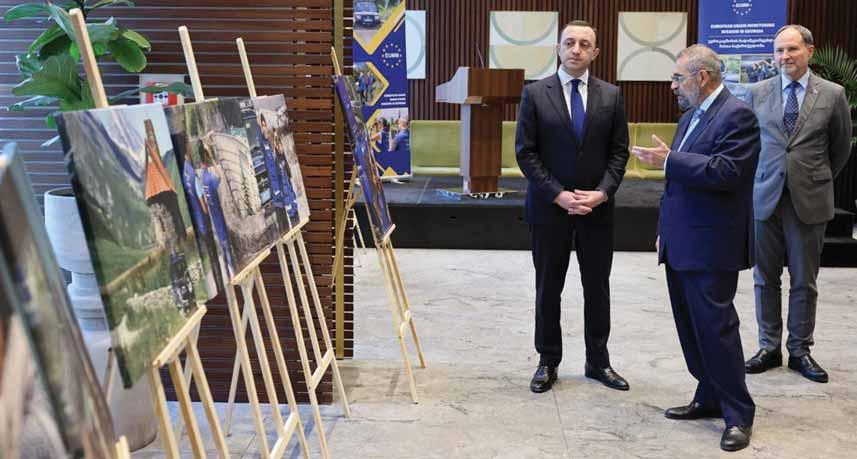
September 27 is associated in Georgia with the loss of control over Abkhazia and the ethnic cleansing of Georgians that occurred in that region. Reportedly, more than 12,000 people died during the armed conflict, while around 300,000 were displaced.
At an event dedicated to the 15th anniversary of the start of operations of the EU Monitoring Mission in Georgia following the August 2008 war in Georgia’s second occupied region, “South Ossetia,” the Prime Minister stated that his government has successfully maintained peace and stability, a foundation for economic progress.
“We are ready to improve the quality of life for all citizens of Georgia, including those in the occupied territories.
“The invasion of Russia in 2008 had severe consequences for our people. The unstable situation due to Russian aggression and the war in Ukraine reminds us of the need for peace and conflict resolution in Eastern Europe, including of the Russia-Georgia conflict. The involvement of the EU Monitoring Mission in this process is crucial, and we hope that sooner or later we will be able to achieve this goal. Let this 15th
anniversary be a testament to what we have achieved together, and a reminder of the ongoing commitment we share to the peace, reconciliation and prosperity of all citizens of Georgia. We all look forward to the day when peace will prevail,” the PM said.
Further, during his speech at the 78th session of the UN General Assembly, the PM said that Russia “still occupies 20
percent of the territory of Georgia”. He then addressed the Abkhazians and Ossetians with the following words: “The enemy of our unity is our common enemy.” Former “leader” of occupied Tskhinvali [South Ossetia], Eduard Kokoity, responded to Garibashvili’s statement, saying he either “has a problem with perception of reality, or lives in his own imaginary world”.
“Garibashvili simply does not understand that Ossetians, Abkhazians and Russians have their own big family, where they are guided by traditional values, where they respect and l ove each other,” Kokoity wrote on Telegram.
Mikheil Saakashvili also weighed in on the conversation, criticizing the increasingly popular use of the term “Georgian-
Abkhazian conflict.”
“Many are using the term GeorgianAbkhazian conflict, which is a lie and Russian propaganda - it's time to label everything as it is: Russia was the initiator of it all. Georgians, Abkhazians and Ossetians were building a united Georgia. Abkhazia is Georgia! Sokhumi will become the most beautiful and safest city on the Black Sea coast.”
GEORGIA TODAY SEPTEMBER 29 OCTOBER 5, 2023 3 NEWS
Photo by Sarah Rainsford in Goris & Kornidzor, Armenia / BBC News Prime Minister Irakli Garibashvili on a visit to the European Union Monitoring Mission HQ in Georgia this week. Source: EUMM
“Russia Can’t Survive in its Current Form” – Interview with Sergei Medvedev on Karabakh and Russia
INTERVIEW BY VAZHA TAVBERIDZE
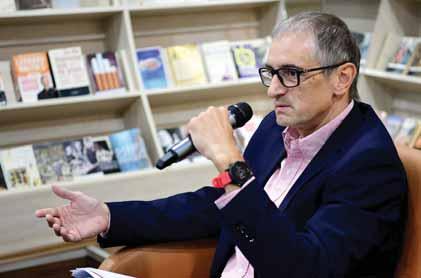
Sergei Medvedev is a Russian scholar and professor at the Charles University in Prague, who has worked at the Marshall Center for Security Studies in Germany, the Finnish Institute of International Affairs in Helsinki, the Istituto Affari Internazionali in Rome, and the Institute of Europe of Russian Academy of Sciences in Moscow. Medvedev won the 2020 Pushkin House Russian Book Prize for his book The Return of the Russian Leviathan. Radio Free Europe/Radio Liberty’s Georgian service sat down with him to find out his take on the latest happenings in the Nagorno-Karabakh region, and how this will affect Russia’s dominance over the South Caucasus.
“The security paradigm won’t change dramatically,” he tells us. “What's happened is not really a surprise. It's really short war, a one-day war. It's clear that Armenia, being the loser in the earlier Karabakh War, was destined to endure another defeat at some point. Azerbaijan wants to solve the Karabakh question, and it looks like it’s well on its way to doing so. It’s also a longer term trend of Russia losing its influence and yielding its influence to more powerful players like Turkey and China. The funny thing is that Russia not only has Uncle Xi, the Big Brother of China, but also Recep of Turkey, too, becoming a big brother for Russia now. It shows how weak Russia has become, a direct consequence of the war in Ukraine and Russia's poor performance, and the fact that Russia is absolutely overstretched.”
HOW WEAK ARE WE TALKING? WHAT INFLUENCE DOES RUSSIA STILL HAVE ON THIS REGION?
There is a residual influence. You see, Russia is still quite strong, and it enjoyed centuries of uncurtailed dominance in the region. And we see in Georgian politics lots of Russian influence. I think Russia will continue putting pressure on Georgia, both militarily, through South Ossetia and Abkhazia, and also via hybrid influence from Russian agents, economic
partnerships, corruption, and so on. So, it's still a very dangerous and powerful player. And Georgia will obviously be one of the objectives. The seed was planted decades ago - the Russia's agents, Russian businesses; it's a whole empire, it doesn't just crumble overnight.
HOW FATEFUL HAS PASHINYAN’S PRESENCE BEEN IN ARMENIA, WITH THE KREMLIN INTENT ON MAKING HIM A SCAPEGOAT FOR ALL OF THIS?
He's in a sense a scapegoat, yes: He had to make this absolutely unavoidable choice right now. The Armenians have a strong sense of national resentment and anger and grief, and they are going to push the blame on him, and the Kremlin will be using this quite smartly, because Putin personally hates Pashinyan. He’s a popular leader, one who was selected and put in power by the Revolution on the street, and that's Putin’s biggest fearstreet revolutions. Putin will be happy to see Pashinyan go. And then we'll see powerful Moscow Armenians, clients, conspiring against Pashinyan, trying to work their way back into Armenian politics.
THIS WILL BE A FIRST PRECEDENT IN THE REGION WHEN TERRITORIAL INTEGRITY IS REGAINED, AND
THROUGH MILITARY MEANS TO BOOT. WHAT WOULD THAT MEAN FOR OTHER CONFLICTS IN THE REGION, GEORGIA IN PARTICULAR?
It’s a perennial game of world diplomacy and world politics: The right of selfdetermination versus the right of territorial integrity. It never plays out completely; it all depends on the situation of the day. Armenia failed completely in this national reunification project, while Azerbaijan has played quite smartly in the past 20 years, building some kind of developmental authoritarianism, using its oil money well, picking a time when Russia was focused on Ukraine. And, of course, it has a strong backup in Turkey. The Armenian backup was Russia, but one can only regret having a backup in Russia, which is known for betraying its allies.
OVER TO UKRAINE. WHO IS WINNING IN THE LONG WAR THAT PUTIN SEEMS TO HAVE RESIGNED HIMSELF TO?
I still think that in the balance of the situation today, Ukraine has the advantage, but it’s a very precarious balance. If we're talking one year from now, I don't know where it will go. The US election will be at stake. And what happens with the Ukrainian population? The problems with grain and destroyed infrastructure? This is all a
Lessons from a Mercenary - Sam Patten, Former Advisor to the UNM and GD, on the Benefits of Switching Sides
Continued from page 1
But having switched sides, I came to question whether I was able to impact the direction and agenda of the Georgian Dream. At informal ‘politburo’ meetings, I was always outnumbered and sometimes accused of being Misha’s spy. As a consultant, one does bear some responsibility for the outcome, and if I could not assure myself this new government would truly fix the problems that brought
its supporters to the polls, then I wasn’t really improving anything.
It turned out my instincts were correct.
Just as the UNM’s reform agenda gave way to increasing authoritarianism, so too did the Georgian Dream’s monopolistic grasp on power. After years of intensive support, opposition parties still struggle, as those in government now don’t seem to appreciate the irony of the shoe being on the other foot.
My good friend from Iraq, Paul Bell – a rugged South African who has seen a thing or two over his years helping guide difficult transitions around the world, and who, unlike me, is sitting in Tbilisi today, sees today’s predicament in Georgia as three-fold. First, there is state capture, then there is distrust in institutions, and, finally, there is the yin-andyang pull between Europe and Russia, exacerbated in no small part by the fact the latter has gone on to invade yet another independent country. No longer paid for my advice, I’ll give it away for free. From the peanut gallery a continent and an ocean away, I’d suggest three things Georgia should and should not do if it wants to be seen as the kind of country that solves problems rather than contributing to them:
Don’t let Misha die in prison. In addition to being inhumane, this would be
very, very thin balance. It's rather a quantum situation. We don't have straightforward parametersthe parameters are changing every day. We cannot discard the Ukrainian resilience and success and the fact that new weapons are coming in, and that Russian resources are thinning out. I hope that Ukraine will prevail and will kick the Russians off its territory in a year or so. I'm not a mathematician, I'm not calculating in my head. Let's say there's reasonable hope that this could happen, but, on the other hand, it is also a reasonable risk. If it protracts for another year or two years, then too many powerful factors could work against it. The fatigue of the West, of the elites, of the Ukrainian population, the elections, lack of military success and so on. Again, it's a very thin balance, and it can go anywhere.
THE CONSENSUS AMONG
THE HISTORIANS I’VE SPOKEN TO IS THAT THIS WAR IS A HISTORY-DEFINING MOMENT. CAN YOU, AS A HISTORIAN, STEAL US A GLIMPSE INTO THE VARIOUS FUTURES, DEPENDING ON HOW THIS WAR ENDS?
Sure. One variant is Ukraine prevailing and consolidating its statehood, and becoming a sort of Israel of sorts - highly militarized, but also a very forwardlooking nation. For Russia, it’s very difficult to see a positive scenario - positive for the world and for the Russian people and for the future, because Russia winning may be positive for the Russian generals in the short term, but in the long run, I think the country is doomed. The question is saving the country from complete failure and collapse.
IS IT STILL DOOMED IF UKRAINE WINS?
No. If Ukraine wins, and Russia accepts the defeat, this will lead to eventual transformation and reform in Russia, and different elites coming to power. It’ll be like Russia accepting losing the war in Afghanistan. We saw how change happened quite soon after. Russia also lost the Japanese war, on the eve of the revolution. So Russia has an experience of losing wars. And this can lead to
positive political outcomes.
SO THE REGIME WOULD BE DOOMED, NOT THE COUNTRY. Yes, the regime could collapse and the country could embark on a process of difficult transformation. But I think the most likely scenario, what I see for Russia, irrespective of the war in Ukraine, is a protracted, ongoing multilayer decay, probably a better situation in the big cities, but the country itself will not find enough reserve to transform itself again. So I see a long Iran scenario, a long Venezuela scenario. Unfortunately, for me, this is the most likely scenario.
THAT ALSO PRESUMES THE WEST WON’T BE TEMPTED TOWARD ANOTHER RUSSIA RESET.
No, no. I think the West will give up on Russia, and there will be a self-inflicted semi-isolation, like limited engagement with the West. Russia will be left to its own devices, to stew in its own juices – so a combination of Iran and Venezuela until whatever the next historical opportunity will be, the big technological revolution, whatever change comes to the world. But in the medium run, I see this, unfortunately, as the more likely scenario, a protracted decay, irrespective of winning or losing the war in Ukraine.
EVEN IF THERE IS SOME SORT OF STALEMATE OR FROZEN CONFLICT?
Yes. This could also be the Korea scenario, a stalemate, and Ukraine could be partially integrated into the West and still get assistance.
WHICH WOULD ENABLE RUSSIA TO SURVIVE IN ITS CURRENT FORM?
Russia can't survive in its current form. Russia has given up on development; it’s preoccupied with surviving. And it can survive for another 20-30 years, there is still enough demand for oil in the world. But there's a big oil revolution going on, with claims the world will give up oil by 2050. So, especially now, with this war, it's pushed things forward and seen people giving up the green agendas. So I predict Russia still has a quarter century just to stew in this condition.
counterproductive on several levels. No, it would not amount to poetic justice; rather, it would be a depressing reminder of how little has been learned.
Don’t impeach the president. Any Georgian would be justified in telling me to take my own advice here. To impeach a president for visiting allies without parliament’s permission is absurd. Unless, of course, the Europeans aren’t allies and, if this is the case, the Georgian Dream should say so clearly and unequivocally.
Finally, relax the government’s grip on institutions. Encourage the growth of a healthy opposition, because having worthy competitors always ups your own game. Let Georgia live out the freedom that runs in its spirit and to be, as it was once called, “a beacon of liberty.”
Not being afraid to switch sides allows one to see their options more clearly and divine a greater purpose. It is in those moments that history happens.
Sam Patten’s Dangerous Company: The Misadventures of a “Foreign Agent” will be released on Amazon on October 3. Preorders are already shipping.
*Sam Patten has advised both Saakashvili’s UNM and Ivanishvili’s Georgian Dream, among other parties.
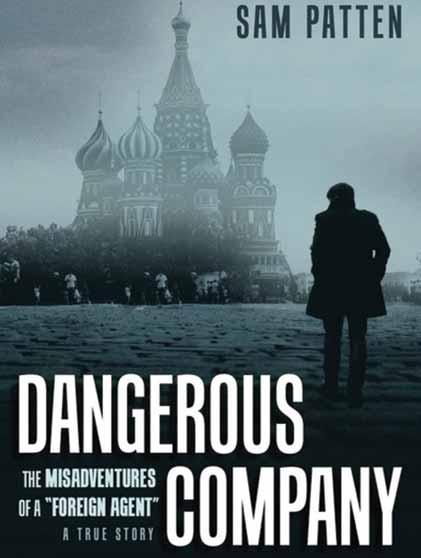
GEORGIA TODAY SEPTEMBER 29 - OCTOBER 5, 2023 4 POLITICS
Sam Patten’s Dangerous Company: The Misadventures of a “Foreign Agent" will be published in October
In Georgia today, there is state capture, distrust in institutions, and the yin-and-yang pull between Europe and Russia
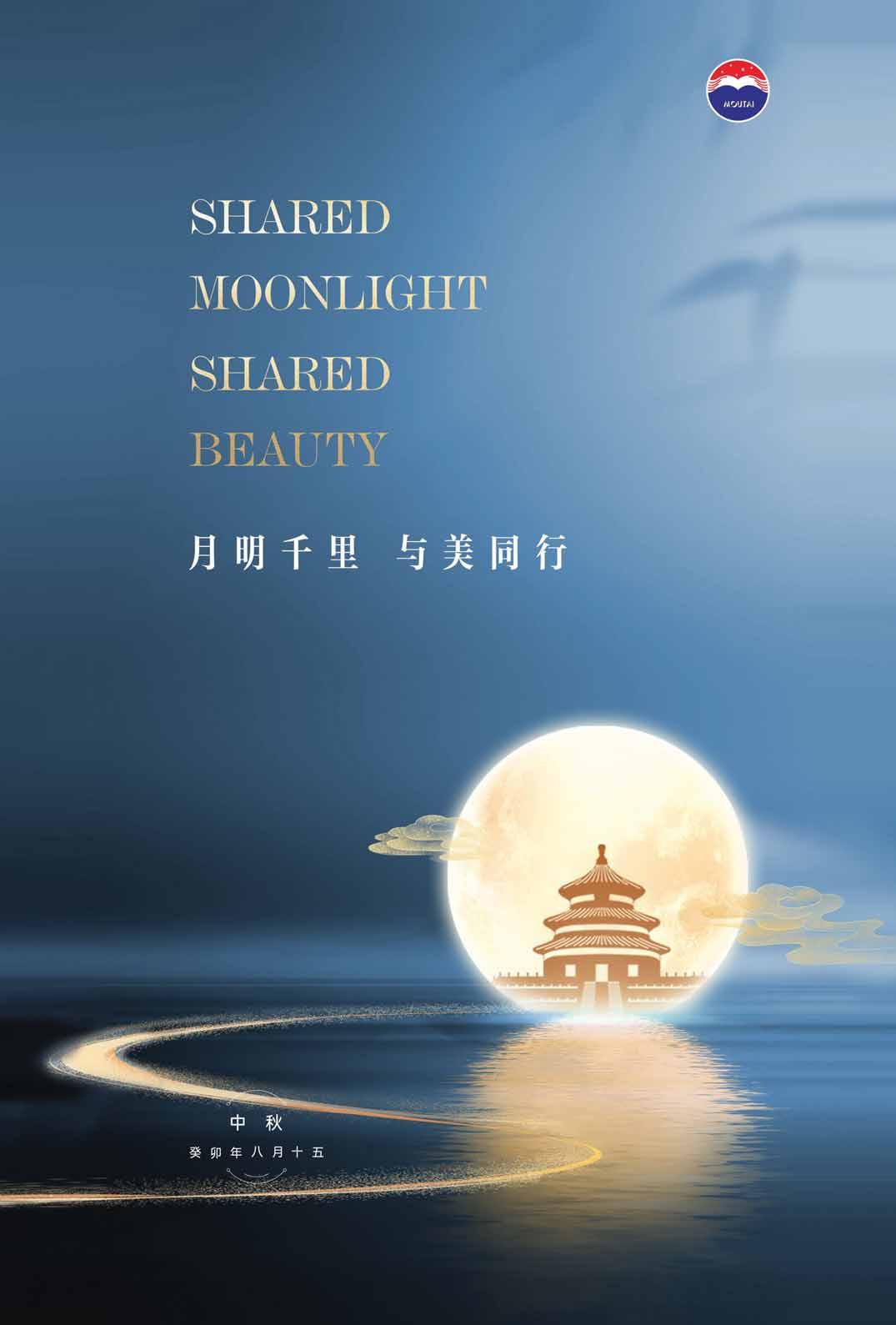
GT Sponsors Georgia & Armenia Tech/AI Hub Summit 2023 in Georgia
BY GEORGIA TODAY
On September 21, the Tbilisi Marriott hosted the highly anticipated Georgia & Armenia Tech/AI Hub Summit 2023, a collaborative effort between Georgia-Based law firm Klein & Pantsulaia and Armeniabased law firm Klein & Iskandaryan. The Tech conference was sponsored again by GEORGIA TODAY, GT Business and Tbilisi Marriott. Speakers included Lineate, Devexperts (in the Fintech space), Quantori (in Healthcare IT) and MaxinAI. An AI workshop was also held by Professor Jose Romero, who is a Mexican Intellectual Property residing in Georgia. DataArt was also present as a special guest delegate.
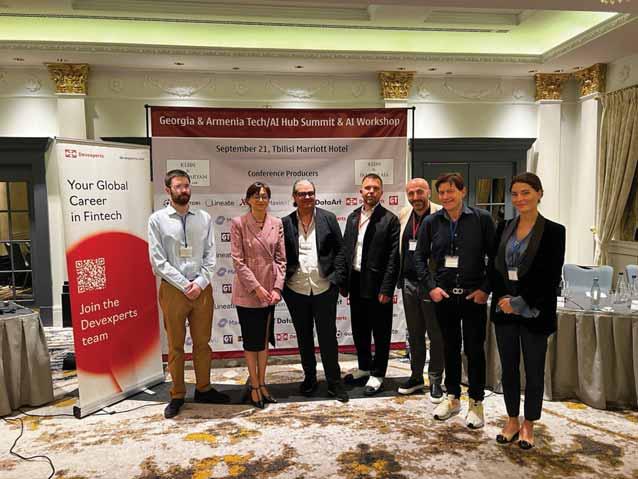
The Summit was honored to have as a panelist Giorgi Tsikolia, Lineate´s Regional Director and formerly Deputy Chief of Mission (COO) Embassy of Georgia to the US.
The panelists spoke about the challenges of doing business in Georgia and Armenia. One issue that some subsidiaries of foreign IT companies faced was the new due diligence on bank accounts by their banks, carried out even if their accounts were a year or more old. Apparently, some of these companies had had their bank accounts frozen in the process.
The consensus of the speakers was that AI will not impact staff numbers at least for the time being. MaxinAI is a local Georgian AI consultancy which assists companies in Georgia and other coun-
tries to use Artificial Intelligence to improve systems, and processes. For example, it helps factories to become more efficient and reduce waste. Another
greening example is using AI to improve power plant efficiencies, resulting in cost savings and reduced greenhouse gas emissions.
There were heated discussions about software coders and their tendency to use the likes of ChatGPT (owned by Microsoft) to create or aid in coding.
Several issues were discussed about the legality of such a use and also if the company where said IT engineer works would own the resulting software. The idea was floated suggesting that companies should probably review code created by staff to ensure that AI had not been utilized, as, if the percentage of code created by developers is in majority done using ChatGPT, they may well find that the real owner of the resulting software is Microsoft.
Klein & Pantsulaia also announced that they are setting up a new AI business consultancy based upon a joint venture with a local Georgian AI consultancy, which has dozens of AI consultants. The next event will be similar to past events, but with a bigger focus on artificial intelligence. The Georgia & Armenia Tech/AI Summer Summit will be held at the Marriott Armenia in Yerevan in mid-November. The date may be adjusted in accordance with the political situation in Armenia as it develops. There will also be an interactive AI training workshop. Devexperts and Oracle are already confirmed as speakers for the event, and IT companies will also be invited.
Legal Insights with Klein Law: November 1 Deadline to Register Foreign Staff Online Proving a Bit of a Headache for Some Companies
 BY DANIEL KLEIN, LEGAL COLUMNIST
BY DANIEL KLEIN, LEGAL COLUMNIST
In August, the government passed new regulations on registering foreign staff on the government website. For those who have only a handful of foreign staff, this is not really a big issue. However, there are a lot of subsidiaries, especially of IT companies, that have hundreds and

in some cases a few thousand foreign IT staff in Georgia. One of the requirements which has made this somewhat challenging is that the labor agreement needs to be filled in online. The labor agreement can be in two languages, but at least one of the languages has to be in Georgian. Lots of companies have been using English only or other nonGeorgian languages. This could be daunting for larger employers, leading to mistrust from employees when they
are asked to re-sign their employment agreement now in two languages. We have received reports from larger employers of employees pushing back against signing their employment agreement a second time. There have even been a few cases where employees have hired their own lawyers, suspicious of their employer’s motives, assuming that perhaps having to re-sign a labor agreement is part of a trick. The filing has to be done at the latest by November 1, or
30 days from the hiring date and twice a year.
According to Klein & Pantsulaia, 'there is a big last-minute rush, or, for technical reasons, the site is sometimes crashing according to some companies. Further, there has not been enough publicity about this, and lots of companies will miss the deadline, and who knows when they will find out about the new regulations.' This is compounded by the fact that the regulation was
announced during the main holiday month: August.
Those who file late can potentially be fined and/or face labor inspection investigations. Other information that now has to be uploaded includes foreign worker visa numbers, bank accounts, and dwelling information. These regulations do not apply to local staff.
THE $20K RULE
For every 50K Lari (about 20K USD) of income that a company has, it is allowed to apply for a foreign workers work permit (which is more or less the same as a residency permit). So, if a company has, say, $200K of income, it is permitted to apply for up to 10 work permits for foreign employees. Companies also benefit from dramatic tax reduction if they become certified in accordance with a program specifically designed for IT companies.
The 6-month accreditation process requires IT companies to show that they are employing bonafide IT staff. If the company decides to sell its services in Georgia, the amount of Georgian revenues cannot exceed 2% of the gross receipts (including funds received to pay staff and expenses) of the whole company in the group. In the event that local revenues exceed 2%, the status could be cancelled. Again, when companies compare Georgia with its southern neighbor Armenia, the tax incentives there are geared towards smaller companies of fewer than 30 staff. In Georgia, the incentives are available for foreign IT companies who do not receive significant revenues in Georgia.
GEORGIA TODAY SEPTEMBER 29 - OCTOBER 5, 2023 6 BUSINESS
Some of the Panelists, Speakers and Conference Producers
Digital Construction Forum 2023
 BY MARIAM MTIVLISHVILI
BY MARIAM MTIVLISHVILI
BIM Solutions is setting up in Tbilisi and organizing the "Digital Construction Forum 2023" – an international conference focused on construction digitization. This forum will enable industry professionals to unite, share insights, and drive a more efficient and innovative construction sector. The Digital Construction Forum 2023 will be held on October 19, where property owners,
contractors and other construction industry stakeholders can learn about best practices in digitizing construction processes (www.bimforum.ge).
The sponsor and partner of the forum is the construction project management company CMS. The sponsors of the digital construction forum are also the construction company Anagi and the architecture company Artstudio Project. In addition, 10 other companies are involved in the implementation of the forum. BIM Solutions Group's partners at the forum are Property Georgia, FIABCI Georgia, Business Media Georgia, EU
BIM Group, EBA (European Business Association in Georgia) and Baltic BIM Management.
“Our goal is to enable companies to leverage BIM (Building Information Modeling) and realize its potential for greater efficiency and productivity,” said Ernestas Beržanskis, Co-Founder of BIM Solutions group. “Together, we are making progress toward a more prosperous and progressive construction landscape.
“We are confident that our extensive experience in modernizing the construction industry in the Baltic countries can also benefit Georgia,” he added. “By shar-
ing our expertise and best practices, we aim to accelerate the implementation of EU construction industry practices and standards in Georgia. We strongly believe that Georgia is committed to the goals of EU integration.”
At this conference, representatives of the governments of Estonia, Latvia, and Lithuania will share their experiences and the advantages of digitization in construction and the implementation of BIM. YIT, one of the largest construction and real estate development companies, will present its valuable insights, while Baltic BIM Management will showcase numer-
ous project examples. The aim is for developers, government officials, private real estate owners and managers, general contractors, and project management companies to gain crucial insights into digitalization, BIM usage, and the benefits they bring to construction and subsequent operation and maintenance phases. Interested persons, construction, design or management companies, as well as representatives of government structures, can register to participate in the forum at the following link: https://tkt.ge/ event/370269/cifruli-msheneblobisforumi-2023
Georgia Advances on Financial Inclusion and Enterprise Financial Transparency with the Support of the European Union and the World Bank
“The project played an important role in improving financial inclusion for all and enhancing financial transparency of companies,” said Miguel Sanchez, World Bank South Caucasus Program Leader for Equitable Growth, Finance, and Institutions. “It has also helped to build foundations for more competitive, transparent, and well-governed institutions and markets in Georgia. These are important elements for Georgia’s continued sustainable growth and jobs creation, and will benefit people and businesses across the country.”
ance market development.
A multi-faceted program of strengthening financial reporting of enterprises helped reinforce financial transparency for better access to financial services.
Due to the project, significant improvements were made in the quality of financial reporting though rollout of International Financial Reporting Standards (IFRS) for Small and Medium Enterprises (SMEs) training courses, resulting in 85 percent for medium enterprises and 91 percent for small enterprises reports submitted correctly.
the 2022 Report on the Observance of Standards and Codes in Accounting and Auditing (ROSC A&A), which was also presented today. The ROSC report also provides new recommendations on further enhancement of the institutional framework for corporate and SOE financial reporting in Georgia.
The European Union (EU) and the World Bank concluded that the Georgia Financial Inclusion and Accountability (FIA) Project has helped Georgia to advance ambitious second-generation reforms aimed at boosting private sector development and enhancing financial inclusion. The €4 million project supported an enabling framework for capital and insurance market development, improved financial infrastructure and responsible financial inclusion, and promoted better corporate and State-Owned Enterprise (SOE) governance and reporting. These reforms are expected to benefit
both individuals and companies through increased access to financial products such as credit and digital payments, as well as improved consumer protection supervision. The improved policy environment and infrastructure for digital financial services will help to ensure that financial innovations in the market can be more safely delivered for broader consumer use.
The FIA project, which officially closed today, was implemented between 2019 and 2023 as part of the World Bank’s support to Georgia under the Country Partnership Framework for 2019-2022 and the EU’s Single Support Framework 2017-2020 for Georgia.
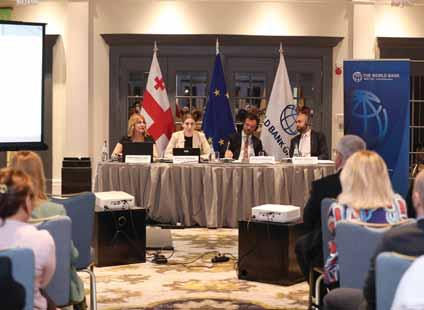
“The EU has long supported Georgia’s reform agenda, including its commitment to economic reforms, transparency, and sustainable economic growth. The launch of this project was an important step to boost private sector development in Georgia,” said Catalin Gherman, Deputy Head of Cooperation of the EU Delegation to Georgia. “4 years on, we see visible improvements in Georgia’s financial structures, business services and investment climate. This EU assistance has boosted private sector development and delivered productivity, transparency and financial inclusion gains for Georgian businesses."
The project supported the alignment of the regulations with the European Union standards in areas such as investment funds and payment services. It also helped launch fintech and financial consumer protection reforms, strengthen a partial credit guarantee program, initiate financial infrastructure upgrades to promote digital payments and movable assets based lending, and advance insur-
Georgia’s progress in the financial reporting reforms was acknowledged in
The project was implemented in close cooperation with the National Bank of Georgia, Ministry of Finance, Ministry of Economy and Sustainable Development, Insurance State Supervision Service of Georgia, State Service for Accounting, Reporting and Auditing Supervision and other private and public stakeholders.
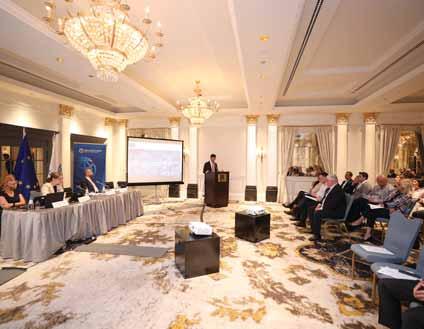
GEORGIA TODAY SEPTEMBER 29 OCTOBER 5, 2023 7 BUSINESS
CENN – The Legacy Will Go On, Says New CEO Laurent G. Nicole
EXCLUSIVE
INTERVIEW BY
KATIE RUTH DAVIES
The summer of 2023 saw the tragic passing of Nana Janashia, whose life was cut short just weeks after she and her team celebrated the 25th anniversary of the environmental NGO she founded with her Swissborn husband, Laurent G. Nicole. It is with a heavy heart and no shortage of emotion that Laurent has taken on the enormous responsibility. However, he remains confident that Nana’s legacy will continue with the support of the brilliant team they built up together.
Laurent is a Swiss chemical engineer and health and safety engineer by trade, with a strong professional background in environmental audit and natural resources management, waste management, DRR, water safety, humanitarian engineering and EIA around the globe, including Georgia.
He first arrived in Georgia in 1993, accompanied the first steps of CENN back in 1998, and since then, has been involved as an advisor on strategic organizational planning and management as well as the chairman of the gov-
erning board.
GEORGIA TODAY was invited to sit with Laurent and hear the story of CENN’s evolution in his own words.
We begin our interview by discussing CENN’s foundation, when he, with his engineering business and humanitarian work for the Swiss Government – a job which necessitated constant travel around the globe, needed someone to take care of his newly founded Georgian environmental engineering business ACTA, a sister to his Switzerland operation.
He was recommended Nana by a Georgian friend. She had just returned to Georgia from studying eco-tourism at the CEU in Budapest, and had set up an environmental project in the South Caucasus, supported by Friends of the Earth International, using “third-hand” computers and a friend’s office internet.
Enamored by the project, Laurent took it under his wing, and their collaboration began, with ACTA in Georgia being run in parallel to what became the Caucasus Environmental NGO Network –CENN.
Their first projects were about communication on environmental issues, awareness raising, publishing multilingual magazines on environmental issuessome dealing with water systems, others with women’s empowerment, the latter something Laurent says Nana was particularly passionate about.
“The needs in the region in the late 1990s were enormous,” Laurent says. In the early 1990s, with Eastern Europe looking increasingly westwards, including Georgia, the countries needed ministries of environment. It was the right time for CENN to jump in.
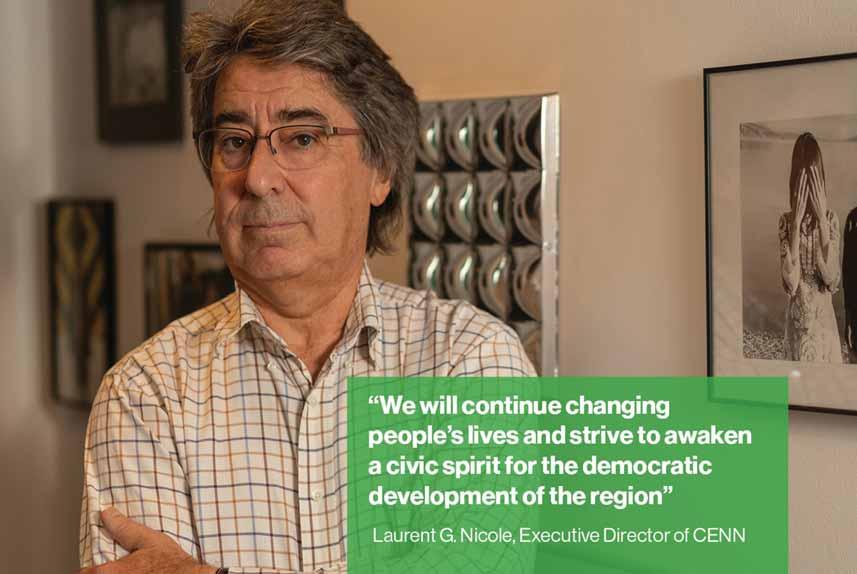
It was at this time that Nana toured Europe and America with Laurent to see what they were doing and how.
“The South Caucasus was at the edge of an enormous turn, especially in its understanding of the environment,” he says. “So, in the late 90s, we started picking up what projects were arriving from the EU, USA, from the Swiss Cooperation Agency. By using the duality of our NGO and engineering company, we were able to open a lot of doors. Our overall vision was environmental protection
and civil society development, in short: Changing the world.”
Laurent is a modest but brilliant gentleman who describes his former role in CENN, which he calls “their first baby,” as Nana’s “shadow” – imparting advice as asked for or required, or making suggestions which best directed CENN toward their global vision of a better world. This was advice he was well experienced to offer, coming from over 40 years’ experience in the field of environmental engineering and civil development across the world in Africa, Asia and Europe.
“In my job, I’m too often leading. I’m comfortable to be in the second role,” he admits. “Nana was from a generation who saw the changes here in Georgia. She liked to be seen and be visible, to introduce me to millions of people I couldn’t remember. We worked together on strategy, human resources, preparedness, and I was and am still Head of the Board, but Nana was the face of it all as I travelled to manage various humanitarian projects and my engineering company and factory in Switzerland.”
Compared to Nana’s bright colors, dazzling smile and ability to make all who knew her fall in love with her and come to support her ideals, Laurent is quieter,
more reserved, though he is an astute businessman with a clear and unwavering work ethic.
Describing the early days of CENN, he says they sought to be reliable and trustworthy from the very first.
“Thanks to our international partners, we have an extremely strict operation manual. They sent us people to help create it, they followed up, demanding to see documentation and accountability to the beneficiaries,” Laurent says. “And at each step of our development, we have happened to meet the right people to help us to be in the right place at the right time, and to get better and better at what we do. It gave Nana great satisfaction to see how we were improving in terms of quality, and how our strong and dedicated team, some of whom are brought from a young age to train and grow in CENN, were developing.”
The Saakashvili era, Laurent notes, is when CENN really took off, moving and growing on the wave of reforms introduced in the first term of the new government. From a tiny two-room flat in Vera in which the husband-and-wife team also lived while working with their small team of 6, the NGO moved to a new office on Chonkadze, and finally to their current home, an earthquake-proof, Swiss and Georgian designed house in the hills of the Old Town, one of three converted buildings accommodating CENN employees - environmental enthusiasts of various specialties.
At 65, it is Laurent’s desire to keep CENN flowing strong and true that “forced” him to step into Nana’s very hard-to-fill boots as Executive Director of CENN, giving up his plan to retire within the next 5 years.
“I know CENN best in terms of the overall approach. In terms of management, I have proven and valuable experience. After she passed, I was elected interim CEO by the board, with no-one against, allowing the administrative mechanisms to go on. I never needed to go into the details of the projects Nana and the team were running; now, I have to jump in and find my way, but I have no doubt that I will catch up. There’s a lot of work ahead,” he admits.
In moving from an advisory to a leading role at CENN, Laurent tells us that he knows his team will guide him in developing strategies, and that he is always open to hearing their proposals.
“To the table, I bring my experience of CENN, my global experience of people around the world, and my environmental engineering side, coming from a combination of biology, geology, economics, and chemistry,” he notes.
Laurent is now treading his first steps into the finer details of the projects that Nana knew by heart, but which he only knew from a distance, and preparing to enter the bright social circle that Nana kept so enthralled – a challenging endeavor that Laurent fully comprehends, given the substantial responsibilities of fundraising, project expansion, policy changes, and the overarching direction of CENN, all in alignment with both his and Nana's unwavering vision.
“I want to ensure that CENN does not have only one face, but many. We have many faces in our strong team, but until now, Nana was always the key,” he says.
On the work looking ahead, CENN has numerous projects on the go, and a lot to try to better in Georgia.
“We work at the grassroots and policy level, with communities, local and national governments, private sector and more importantly with the youth, raising awareness of the system they are in and their role in that system; how to instigate change and not to expect or wait for handouts like a cuckoo in the nest, as it is in many countries, if not worse. We enable people to be responsible,” he says. “Incivility is everywhere in the world. I fight it as much as I can wherever I go, encouraging people to respect the rules, pay their taxes, ensure their money is used properly to give their country a proper education system, proper healthcare, proper roads, proper waste management, electricity in the cables, water in the taps, and everything working smoothly. At CENN, we are waking up the civil spirit of the people.”
“Nana and I spent nearly 25 years working seven days a week, but that’s how we achieved what we did. Half our team were still in diapers when we started,” he admits. “But when I see the level of dedication to our activities today, I would say that we can believe that this generation will participate in the change. It’s extremely motivating. So many people believe in CENN, that we are changing the world,” he says. “This is what Nana wanted. Simply put, the show must go on. And it will.”
GEORGIA TODAY SEPTEMBER 29 - OCTOBER 5, 2023 8 BUSINESS
Our overall vision was, and still is, environmental protection and civil society development, in short: Changing the world
I never needed to go into the details of the projects Nana and the team were running; now, I have to jump in and find my way, but I have no doubt that I will catch up. There’s a lot of work ahead
I see the level of dedication to our activities today; we can believe that this generation will participate in the change
Moving Back Down
buttresses because we can’t afford the time or money to replace it entirely yet. This length of about 100 meters gets the most snow building up against it over the winter, almost burying it sometimes. Cow will probe for and damage weak spots to get at our “grass is always greener” in late winter or early spring.
Put all manner of valuable things inside, out of sight means out of mind. This will be aided by the eight video cameras mounted on all four corners of the house, which I can access from anywhere in the world by cell phone. Tools, materials, supplies.
BLOG BY TONY HANMER
Idon’t know if this will become an annual thing for a number of years, instead of merely becoming the second time. But my wife and I are once again doing what most of Tusheti does, only from Svaneti: moving out for the winter. Back to Tbilisi. The date is rather written in stone this time, with a couple of firm dates we can’t miss in the capital at the end of Septem-
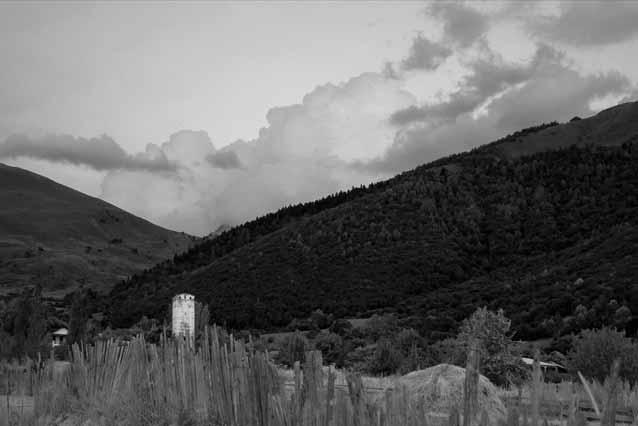
ber acting as a wall against we must try not to dash ourselves to pieces. As a result, I have been making a careful list of all we need to do before leaving Svaneti; amending, crossing off, and nearing the finish. It has been very helpful to have a friend offer to stay with us until the bittersweet end and help with myriad tasks.
Re-do the fence at the far end of the property, replacing ugly messed-up old wood posts and slats with metal posts concreted in, joined together with diamond-pattern galvanized wire! For this, up to four of us were working simulta-
neously. The concrete all needed mixing by hand, two guys with shovels on a sheet of iron: cement powder, sand, water and hand-gathered stones. Dig holes for the posts and channels for the concrete, all too by hand; wire in the mesh; hammer in wood plank forms to hold the stuff in place as it dries. Nice and strong, to send a message to the neighbors’ bovines that We Will Not Be Assailed. This was Job Number 1 before leaving: Done. Strengthen the weaker wire-and-slat fence along the top of the property with
Disconnect water everywhere. This is actually our first entire winter away, and once the water stops, it’ll eventually freeze. So there’s no taking this step back until spring allows the pipes to thaw again. They won’t burst because they’re plastic.
Potted plants and flowers off to a neighbor to keep indoors for the winter. Potatoes, carrots, beets to dig; remaining raspberries, plums, apples and pears to pick. All of these foods to take with us for the winter.
Padlocks on three gates, keys left with a local friend as well as taking a spare
set ourselves. Closing down the shop. Hot water tanks in all bathrooms, and toilets too, drained so they can’t freeze and crack; this is a last-minute thing, just as we leave. Water master switch off. Pack clothes, foods, miscellaneous items: camera gear, external hard drives, cables and so on. Money, passports, keys. Most electricity to the house off, leaving on only the modem to the cameras and the chest freezer with a few things in it which have nowhere else to go. Goodbyes to neighbors and friends, even as we prepare to greet long-unseen others in Tbilisi, Kakheti and elsewhere. Strange double life. It may end up being a permanent shift to Tbilisi, but not yet, not yet. Time will show us the way forward. Until then, Tbilisi, here we come.
Tony Hanmer has lived in Georgia since 1999, in Svaneti since 2007, and been a weekly writer and photographer for GT since early 2011. He runs the “Svaneti Renaissance” Facebook group, now with over 2000 members, at www.facebook.com/groups/ SvanetiRenaissance/
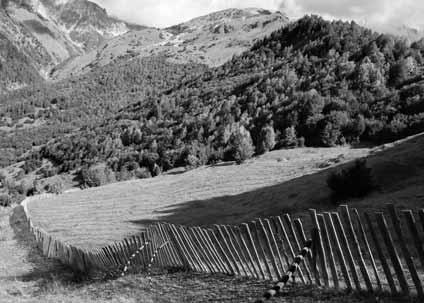
He and his wife also run their own guest house in Etseri: www.facebook.com/hanmer.house.svaneti
Georgian Wrestling on Its Way to the Olympic Family
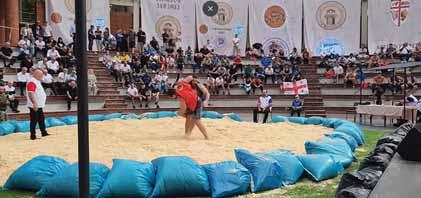
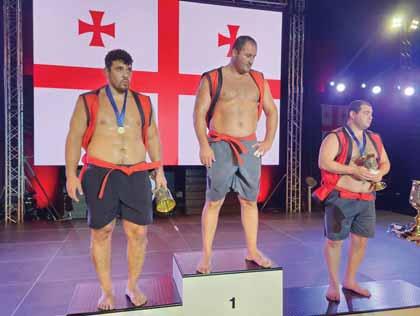 OP-ED BY NUGZAR B. RUHADZE
OP-ED BY NUGZAR B. RUHADZE
There are people in this country and beyond its boundaries, who strongly believe that Georgian Wrestling –Chidaoba – has a realistic chance to become an Olympic sports category, just as the famous Japanese Judo wrestling became, in its own time, a part of international competitions, including world championships and the Olympic Games. The historical fact of global acknowledgement of Judo was no accident: It was the happy logical consequence of tens of years of sweat, and persistent, nonstop talking to the world that Japanese Judo won the honor to be internationally recognized and fought by the rest of the world.
Our far-going thoughts, dreams and plans to this extent are no different from the Japanese ones, and the thinking, nurtured in the Georgian national mind, is quite similar to the Japanese model when it comes to the idea of internationalizing Georgian Wrestling. Just imagine, some lucky morning in the future, we wake up to the wrestlers of the world, fighting in the Olympic arenas for the champion’s title in Georgian Wrestling. This might be hardly fathomable at this moment in time, but it could be quite fulfilable several years from now!
Let’s now see what is being done for all this to happen in real sporting life.
Chidaoba is an ancient ethnic version of martial arts, which is habitually practiced by the male population in almost every region of Georgia, slightly varying from place to place in terms of feints and terminology, but remaining a whole-
some unique version of wrestling in general. Interestingly, the fights are accompanied by Georgian ethnic music performed with drum and pipe. The function of the domestic development of Chidaoba is the obligation of the National Federation of Georgian Wrestling. An International Federation (the IFGW) was also created not so long ago in order to internationally promote both the idea and the detail of Chidaoba, thus finally putting Georgian Wrestling on the Olympic family roster as one of the events of the Games. It is headed by Giorgi Bakradze and its general secretary is Giorgi (Gya) Shiukashvili, both of them solidly contributing to the Federation’s activities in their own way. Shiukashvili’s energy, mentality, patriotism, dedication to sports, love for Georgian Wrestling, education, and his business acumen, all this taken together, is what the Federation stands on so firmly and confidently, propelling Georgia towards the Olympic and other international sporting events. Gya Shiukashvili is faithfully and vigorously supported by his amazing partner, the vice-president of the IFGW, Merab Iliadis, currently residing in Greece, and lavishly using his time, energy and money on internationally promoting and supporting Georgian Wrestling.
Incidentally, this past Sunday, September 24, in the beautiful Greek city of Thessaloniki, an amazing sporting event took place, organized by the International Federation of Georgian Wrestling and sponsored by Gya Shiukashvili and Merab Iliadis. The venue of the event was the amphitheater in downtown Thessaloniki. It was the Georgian Wrestling European Championship, with participants from 19 countries. The competition ended in the evening with the final fight, won by Lasha Bughadze, a skillful Georgian Wrestler, who received a special prize and 20,000 Euros as a reward for his
glorious victory. The runner-up was awarded 10,000 Euros and the third-place winner, 5,000 Euros. Yet, the most valuable prize of the Championship was the Golden Fleece, gilded in real gold, the mythological symbol of historical relations between Greece and Georgia. The new champion made a circle around the amphitheater arena to demonstrate the gorgeous prize, resting on his powerful shoulders, to the public. The prize is transitional and it will always be kept in the premises of the national Olympic committee of the winning country. That’s the way the valuable tradition was born that magnificent day, this being surely conducive to the cherished moment when Chidaoba becomes an actual Olympic event.
The finale was followed by a wonderful concert program, produced by the talented young professional directors Otar Chachanidze and Manana Bakradze. The story of Chidaoba and its functioning rules was presented on the stage by our reputable athlete Nikoloz (Nukri) Mchedlishvili, two wrestlers demonstrating the feints while he was speaking. A lot of applause went to famous Georgian singer Nato Metonidze and renowned pianist Vato Shiukshvili. The program was led by the wonderful Elene Kalan-
dadze, a Public Television journalist, with her implacable English and refined stage manner, and, together with her, the author of this piece, dressed in Georgian national attire. Present at this outstanding event were the former famous Georgian Palavans (title-holding heroic wrestlers) like Shota Khabareli (main referee of the event), Temur Khubuluri, Alexi Davitashvili and many other wrestling celebrities. Among the honorary guests were the First Vice-Speaker of the Georgian Parliament Giorgi (Gya) Volski and the official of the Georgian government Irakli Tripolski. And finally, nothing would have been as well-organized and deliberated to the last detail without the efforts and care of Nino Shubladze, the IFGW Project Manager. The event was filmed from A to Z and will later be broadcast on television.
Conclusively and most importantly, the Thessaloniki Georgian Wrestling European Championship turned into a genuine celebration of Greco-Georgian friendship and cooperation, which is undoubtedly valuable for both sides. This is exactly what the Mayor of Thessaloniki himself, Konstantinos Zervas, underlined in his greeting speech at the very start of that radiantly happy and significant sporting event.
GEORGIA TODAY SEPTEMBER 29 OCTOBER 5, 2023 9 SOCIETY
SPORTS
Georgian wrestling in Thessaloniki. Source: IFGW
Lasha Bughadze, a skillful Georgian Wrestler, received a special prize and 20,000 Euros as a reward for his glorious victory. Source: IFGW
Photographer Tony Hanmer to Participate in New Exhibition This Weekend
BY KATIE RUTH DAVIES
Inspiring photographer, journalist and Svaneti guest house owner Tony Hanmer is to have 16 of his photographs featured in a group exhibition titled “Rust,” which opens on Saturday 30 September, 7pm, at The Exchange Gallery (address below).
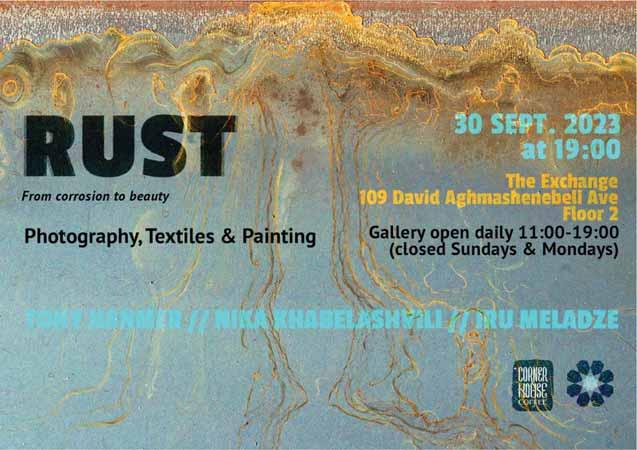
Tony says: “My first show in over a decade. Delighted to be back exhibiting, with strange new worlds on view and more to come!”
Alongside Tony’s photos, the exhibition will also feature textiles and paintings by Nika Khabelashvili and Iru Meladze, all under the umbrella of one theme: Rust, from Corrosion to Beauty.
Tony has been sharing his most recent photography journey with us through his weekly blogs for GEORGIA TODAY. He has a unique eye for details, seeing in the most mundane objects, play of light and shadow, and simple landscapes, dragons, dancers, animals, people and outworldly forms, from which he weaves stories and legends.
This year he became enamored with rust. It started with a February visit to a steel materials stockyard in the city, on the edge of Tbilisi’s Eliava Bazaar. At the time, Tony wrote: “We had looked around to find one which wasn’t roofed, demonstrating a certain divergence in the steel sellers’ and my own preferences: They want to minimize rust on their product
(forming as a result of rain and snow), whereas I want to photograph the rust and am not interested without it. We found what we were looking for, and then returned so they could video me taking my shots, part of a documentary film they
are making of me as an artist.”
“Because I can find beauty everywhere, it was not hard to be delighted. The alien worlds and freakish landscapes were sights I have never seen before, just lying out there in the open for anyone who will
(or can) notice and be dazzled,” he said. He took these captured images home to process on his computer, increasing the saturation and contrast, “making them pop,” and converting some into black and white.
He returned to the steel yard again in June.
“I first looked at the topmost sheets of new steel wherever I could find them: it had been a few months ago that I was last here with my film crew, so I could reasonable expect some sales to have revealed at least one new layer on each pile. In this I was not disappointed. The color ranges and literally unimaginable forms lay spread out around me, and I started shooting, simply using my camera’s 18-55 mm kit lens,” he wrote after the experience.
“It’s really just a matter of composing a scene in the rectangle of the viewfinder, eschewing formal centered-subject balance for something more interestingly off-center. Although all of what I’m seeing is abstract, it either suggests something concrete or represents a purely alien scene, which suits me fine.”
“I’m not out to document reality but to find or make beauty everywhere I go,” he tells us. “Even something as entropic, mundane and undesired as corrosion from moisture on ferric surfaces can be transformed into little planes of existence which sparkle with imagination.”
Be sure to go and see his works at the enchanting exhibition this weekend – it is guaranteed to open your eyes to something new and unexpected.
The Exchange
109 Aghmashenebeli Avenue, Floor 2, Tbilisi
Gallery open Tuesday – Saturday, 11am – 7pm. Closed Sundays and Mondays.
India in “Kartlis Tskhovreba”
BLOG BY ARUNANSH B. GOSWAMI, AUTHOR, HISTORIAN AND ADVOCATE IN THE SUPREME COURT OF INDIA
The author of this article was in Georgia recently, a country that has a long history of connection with the author’s homeland, India, from ancient to modern and contemporary times. Georgia has long been the meeting point of diverse cultures, and, arriving with migrants from different parts of the world, this author landed in Tbilisi, the capital of Georgia, a beautiful city which according to legend was founded by King Vakhtang I Gorgasali (c. 442– 502), one of the founders of Georgian statehood. Considered a saint by the Georgians, he is buried in the
cathedral of Svetitskhoveli, also known as the “Cathedral of the Living Pillar,” in Mtskheta, the ancient capital of Kartli, the east Georgian kingdom from the 3rd century BC to the 5th century AD.
I spent lot of time in the cathedral of Svetitskhoveli. Readers who have read “Kartlis Tskhovreba” (The Life of Georgia), a history of Georgia, will be aware that my homeland, India, is mentioned several times in it, and King Vakhtang I Gorgasali has an Indian connection.
In this article, GEORGIA TODAY’s readers will learn about the historical links between Georgia and India according to “Kartlis Tskhovreba.”
When I was in Mtskheta, I visited the tombs of Holy Equal-to-the-Apostles
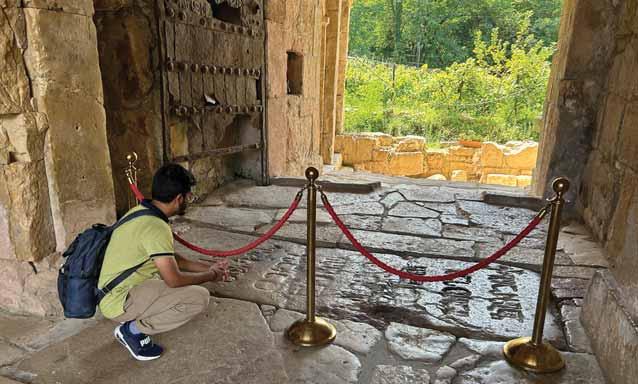
King Mirian, and the tomb of St. Mirian’s wife St. Nana, Empress of Georgia, and Equal to the Apostles, located in the upper church at Samtavro, where today a convent in honor of Saint Nino who
brought Christianity to Georgia is located.
King Mirian’s younger brother was Bartam, whose maternal grandfather was King of India. When Mirian was forty years old, his father, the King of the Persians, Khosrov Ardashir Sassanid, died, and after him the Persian King was Mirian’s younger brother Bartam.
Bartam’s claim to the Persian throne was challenged by Mirian and, in order to avoid bloodshed, the elders and marzapans of Persia undertook mediation between the two brothers. They considered the matter and gave the reign over Persia to Bartam, and to Mirian, in order to console him, they gave Jazira, half of Sham and Adarbadagan. All this was joined to Kartli, Armenia, Ran and Movakan.
The Sassanids, the dynasty in which, according to “Kartlis Tskhovreba,” the first Christian King of Georgia Saint Mirian was born, ended with its last
monarch Yazdegard Shahryar III. After that, most of the Persians, who followed the Zoroastrian faith, migrated to India to avoid the Arab persecution. Another Georgian monarch with an Indian connection was Vakhtang I Gorgasali (c. 442– 502), of the Chosroid dynasty, who was a king of Iberia (Kartli or eastern Georgia). As a general in the Persian army, he invaded India. According to “Kartlis Tskhovreba,” the area in India they invaded was then probably ruled by Hephthalites, also known as "White Huns." A viceroy set by Hephtalites in Gandhara, known as Tegin, became overlord of North and Central India after the fall of the Gupta Empire. It was probably the Hephtalites that King Vakhtang I Gorgasali defeated.
In “Kartlis Tskhovreba,” it is mentioned that “There was a custom there (India): the camp of the loser in single combat took flight. King Vakhtang beat fifteen bumberazis, who had killed many Persian giants. They spent three years fighting in India, and seized most of the Indian lands, but they could not overpower the fortress towns and castles, for they were surrounded by great walls. They took tribute from the Indian King, and with one thousand liters of musk, the same amount of amber, ten ships full of perfume, a whole ship of rubies and emeralds, and all kinds of sapphires, one hundred camels loaded with gold and five hundred camels loaded with silver, from India they entered Sindia” (perhaps the Sindh province now in Pakistan, lot of Sindhis live in India too).
King Vakhtang Gorgasali showed his martial prowess even in his battle against the King of Sindh, and defeated him in combat. He took the defeated King of Sindh to his ruler the King of Persia. “Kartlis Tskhovreba” claims that King Vakhtang then gave advice to the King of Persia that “…let the King of Sindh go free, and take from him a tribute and hostages, because it will be impossible for the Persians to conquer Sindia. The Persian King liked Vakhtang’s advice: he let the King of the Sinds go and took
from him twice as much tribute than he had taken from India, and his sons as hostages, and all that tribute he gave to Vakhtang.”
Even though Vakhtang had defeated the King of Sindh, he did not kill him, but brought him alive to the King of Persia and convinced the King of Persia to set him free. As such, the King of Sindh, feeling a great fondness for Vakhtang, made friends with him. He gave Vakhtang great and incomparable gifts, and the Persians and Georgian general Vakhtang Gorgasali left Sindh the fourth year after they had invaded, and the Sindian towns – Sindas, Topori and Kimrail – remained intact. King Vakhtang brought dark red rubies from India and Sindh to Georgia, which were buried in Ujarma. India and Georgia are far apart geographically, but, historically, we are connected. Indians have been living in the South Caucasus for a long period of time, and even had kingdoms in Greater Armenia. India has a thriving community of Eastern Orthodox Christians, their Church being an Apostolic Church brought by Saint Thomas the Apostle to India. The traditions of Malabar, Coromandel and the Persian Church held that Thomas the Apostle died near the ancient town of Mylapore in India. St. Thomas became a martyr in A.D.72, and was buried in Mylapore.
Like Georgia, India also has a long history of Christian presence in its territory and, like Georgia, India has been invaded by several Turkic invaders. But, like Georgia, India survived, and today both India and Georgia are independent countries with friendly relations.
After visiting Georgia, this author can say Georgians are substantially a friendly and hospitable people, and the friendship between India and Georgia should be strengthened. We should read more about each other’s history and culture and visit each other’s countries. People to people diplomacy is a strong way to strengthen friendships. I am looking forward to visiting Georgia again soon. God bless the India-Georgia friendship.
GEORGIA TODAY SEPTEMBER 29 - OCTOBER 5, 2023 10 CULTURE
Near the tomb of King David IV “The Builder” in Gelati Monastery in Georgia.
Photo by Dr. Arkaja Goswami
Tbilisi Hosted the Final Concert of Night Serenades 2023
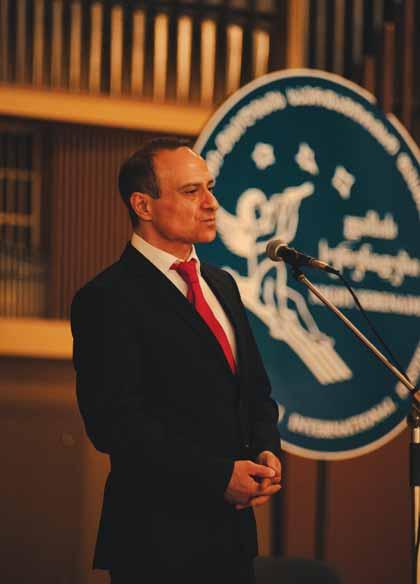
Verdi, Giacomo Puccini, Wolfgang Amadeus Mozart, Neapolitan songs, universally recognized masterpieces of instrumental music- works of Johannes Brahms, Dmitri Shostakovich -were performed. Georgian music was also played: "Ase Chonguri" and "Kuchkhi Bedineri" from Otar Taktakishvili's vocal cycle "Megrelian songs".
In Batumi, Hayon Park, together with the Georgian pianist Tamar Lichel, performed the violin sonata of Cesar Frank in an extraordinary way. Beethoven's violin concerto was played accompanied by the base orchestra of the festival "Georgian Virtuosos."
At the final concerts in Tbilisi, excellent pieces by Gioachino Rossini, Umberto Giordano, Pietro Mascagni were performed for lovers of classical music.
On the final evening of the festival, the music of Mozart was heard. Mozart's Rondo and Violin Concertos were performed by Laura Marzadoriv, an internationally acclaimed soloist and chamber musician, currently the first violinist of the La Scala Orchestra. She was accompanied by "Georgian Virtuosos."
"We are glad that this tradition continues, and we thank the top-ranking participants and the audience, as well as our sponsors and supporters," said the organizers.
Night Serenades held its final concert of the 15thanniversary festival in Tbilisi. The creative group offered concerts packed with a diverse program for the classical music-loving public. Both Georgian and foreign musicians participated in the festival.
"We are very happy that we were able to hold a very diverse and interesting festival in three cities - Borjomi, Batumi, and Tbilisi,” said festival director Nina Tsagareli. “In parallel with classical music concerts, we organized workshops, master classes, and an exhibition. It is also very gratifying that the National Symphony Orchestra was our partner. Special emphasis was placed on violinists at the festival, with Hayon Park, a Korean violinist from London, virtuoso Laura Marzador, the first violinist of La Scala, our Veriko Chumburidze, as well as vocalists from Germany, Italy, our pianist Tata Lichel and maestro Beatrice Venetsi."
"The essence and meaning of the festival is the impulse to charge people with positive energy,” said Giorgi Isakadze, artistic director of the festival, a musician himself and a teacher, as well as the founder and director of the Ingolstadt and Munich Music and Dance Academy and School, and the nephew of festival founder Liana Isakadze. “Since the establishment of Night Serenades, Liana's desire has been to promote and develop this greatest treasure, classical music.
After all, classical music is one of the most important cores of humanity's spirituality."
At the opening of the festival in Borjomi, arias from the operas of Giuseppe
"I performed Tchaikovsky's violin concert for the first time and also played for the first time at Night Serenades,” said internationally recognized violinist, winner of the Veniavskyi competition, Veriko Chumburidze. “This day will be unforgettable for me, because being a participant of the festival founded by Liana Isakadze is a great honor. I was 13 years old when I met Liana, and I was very happy when she invited me to this festival. Liana Isakadze is my favorite Georgian violinist, I have the greatest respect for her."
The founder of the festival is the
world-famous violinist and conductor Liana Isakadze, while the artistic director is Giorgi Isakadze. The organizer of the festival is the company "Art Alliance," and the director of the festival
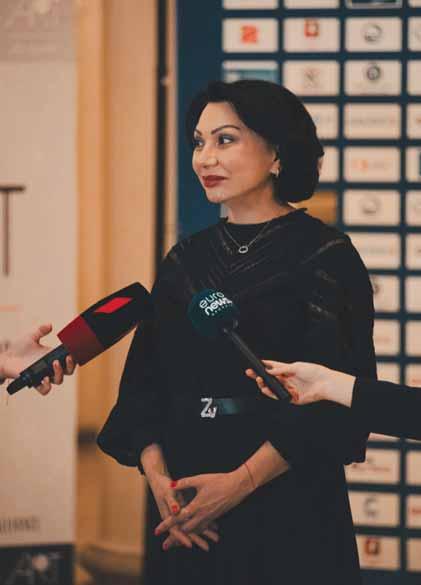
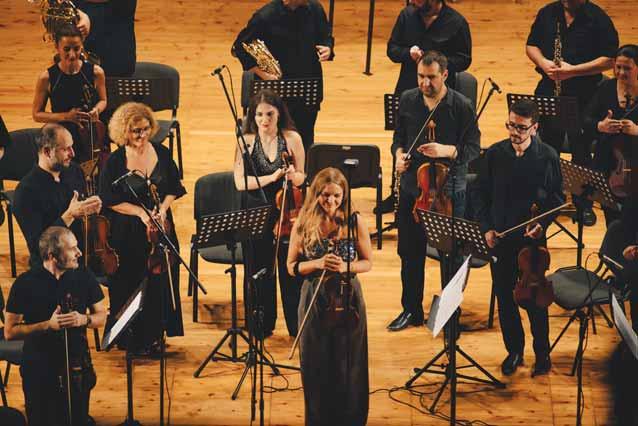
is Nina Tsagareli. Supporters of the festival include the Ministry of Culture, Sports and Youth of Georgia, Batumi City Hall, Tbilisi City Hall, Borjomi City Hall, Ministry of Education, Culture and Sports of Adjara, Embassy of Italy in Georgia, Embassy of Germany in Georgia. The host hotels are Borjomi Likani and Hilton Garden Inn Tbilisi.
Festival partners include the National Symphony Orchestra and Professional State Drama Theater named after Ilia Chavchavadze of Batumi. Additionally, the furniture house "Nita," the chain of perfume stores "Lutecia," the founder of herbal cosmetics from France "Yves Roche," the company "Sarajishvili," and the "Wine Cellar" of the Khutsishvili brothers, as well as the premium direction of "HOTSALE.GE" and a pharmaceutical company "PSP" extended their support. News supporters include Adjara Public Broadcaster, First Channel of Georgia, "Rustavi2" TV Company, "Imedi" TV Company, "Post TV," "Euronius Georgia"; "Georgian Times" Media Holding, Patriarchal Television "Ertsulovneba," "TV25" , Media and digital communications agency "Clip Art," information portal "Ambebi.ge", information agency "Prime Time," "Georgian Press," English-language newspaper "Georgia Today," English-language daily newspaper "Messenger," magazine "Sarke," newspaper "Adjara," Radio "Fortuna" and website Fortuna.
PUBLISHER & GM
George Sharashidze
COMMERCIAL DEPARTMENT
Commercial Director: Iva Merabishvili
Marketing Manager: Natalia Chikvaidze
EDITORIAL DEPARTMENT: Editor-In-Chief: Katie Ruth Davies
Journalists: Ana Dumbadze, Vazha Tavberidze, Tony Hanmer, Nugzar B. Ruhadze, Mariam Gorkhelashvili, Mariam Mtivlishvili, Erekle Poladishvili
Photographer: Aleksei Serov
Website Editor: Katie Ruth Davies
Layout: Misha Mchedlishvili
Webmaster: Sergey Gevenov
Circulation Managers: David Kerdikashvili, David Djandjgava
ADDRESS 1 Melikishvili Str.
Tbilisi, 0179, Georgia
Tel.: +995 32 229 59 19
E: info@georgiatoday.ge
F: GeorgiaToday
ADVERTISING & SUBSCRIPTION +995 555 00 14 46
E-mail: marketing@georgiatoday.ge
Reproducing material, photos and advertisements without prior editorial permission is strictly forbidden. The author is responsible for all material. Rights of authors are preserved. The newspaper is registered in Mtatsminda district court.
Reg. # 06/4-309
GEORGIA TODAY SEPTEMBER 29 OCTOBER 5, 2023 11 CULTURE
TODAY
GEORGIA







 BY MARIAM GORKHELASHVILI
BY MARIAM GORKHELASHVILI





 BY DANIEL KLEIN, LEGAL COLUMNIST
BY DANIEL KLEIN, LEGAL COLUMNIST

 BY MARIAM MTIVLISHVILI
BY MARIAM MTIVLISHVILI






 OP-ED BY NUGZAR B. RUHADZE
OP-ED BY NUGZAR B. RUHADZE





